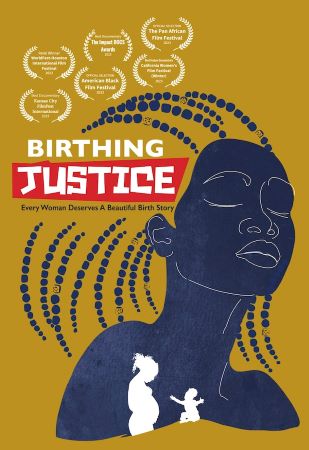
Birthing Justice 2022
Distributed by The Video Project, 145 - 9th St., Suite 230, San Francisco, CA 94103; 800-475-2638
Produced by Naomi Ranz-Schleifer and Sachen Artis
Directed by Monique N Matthews
Streaming, 86 mins
College - General Adult
African Americans; Race Relations; Women’s Health
Date Entered: 02/06/2024
Reviewed by Erica Swenson Danowitz, Chat Reference Librarian/Contractor: PA Chat with a Librarian; Research Librarian: Paratext; Retired Reference Librarian, Delaware County Community CollegeIn 2023 Olympic gold medalist Tori Bowie made headlines when she died alone from pregnancy complications. Her passing at 32 underscored the maternal health crisis faced by many African American women as numerous news media outlets noted. Birthing Justice was completed before Bowie’s death but addresses many of the issues black women in America (such as Bowie) face when seeking adequate maternal health care. The film presents sobering statistics related to black maternal health. Black women are three to four times more likely to die from pregnancy complications compared to white women and this statistic has only worsened in recent years. Overall infant mortality rates in the United States have also escalated compared to other countries. The film notes that 84% of these pregnancy-related deaths are preventable but gross injustices remain in the American health care system including widespread implicit bias and large areas of the United States that have no hospitals or medical facilities nearby to provide prenatal care.
Birthing Justice visits various sections of the United States including Washington DC, Augusta, Georgia, Southern Los Angeles, St. Louis, and the Missouri Bootheel to demonstrate the variety of health care support systems that exist or do not exist for black women and their children. Through particular programs or other support organizations, certain regions of the United States have succeeded in improving the overall infant mortality rate and the prenatal care black women receive. This film also includes interviews with doctors, patients (from these various locales), lawmakers, and Bowie’s teammate, the Olympian Allison Felix. These individuals share their medical experiences and their efforts to improve medical care for all BIPOC families. In these interviews certain individuals discuss their own negative experiences while receiving prenatal treatment including medical professionals who treated them indifferently, ignored their concerns, or who made important decisions concerning their care without consulting them. Highly experienced African American physicians also often encounter dismissive behavior by colleagues who question their diagnoses despite their expertise.
This film promotes the importance of having a diverse pool of medical practitioners. This diversity would help 1.) address issues of implicit bias, 2.) acknowledge the historical mistrust many in the BIPOC community feel toward medical providers, and 3.) eradicate the systemic racism still found in medicine. Birthing Justice provides a brief history of the deep-rooted racism still found in medical curricula and notes that most medical schools do not include any anti-racism training. Where such instruction does exist, it has made a difference. This film includes scenes of African American patients visiting BIPOC doulas and in-hospital nurse-midwives during their pregnancies or deliveries. It reveals the empowerment or encouragement these individuals can generate by providing positive care, listening attentively to patients, and establishing trust. The film also discusses proposed federal legislation called the “Momnibus” Act that would provide support and assistance to improve black maternal health in the United States.
One of the individuals interviewed for this film mentions how years later she still remembers the medical providers who treated her well and those providers who treated her terribly. Birthing Justice offers the opportunity for all viewers to examine their biases and how they might treat or view a particular patient or another human being. This film is available in a variety of formats that can include public performance rights. Two discussion guides are provided with purchase. Birthing Justice includes images of childbirth and prenatal exams that might not be suitable for all audiences. It is recommended for advanced high school classes and college courses in such disciplines as African American Studies, Health Communication, Health Sciences, Psychology, Sociology, and Women’s Studies. It should also be required viewing for all medical school students.
Awards:Best Director (Documentary), DTLA Film Festival; The Impact DOCS Awards, Best Documentary; Kansas City FilmFest International, Best Documentary; California Womens Film Festival, Best Feature Documentary; WorldFest-Houston International Film Festival, Remi Winner
Published and licensed under the Creative Commons Attribution 4.0 license. Anyone can use these reviews, so long as they comply with the terms of the license.